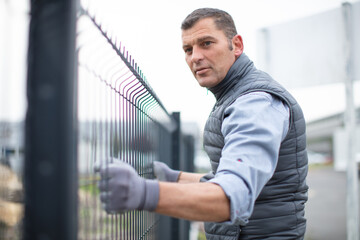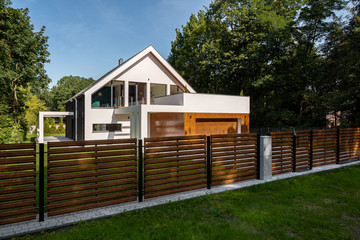Nashville Fence Company provides essential services for property protection and enhancement. Fences define boundaries and improve privacy. Professional installation ensures stability and durability. Well-designed fences also boost property value.
Fence companies specialize in various materials and styles. Wood, metal, and vinyl are common options. Each material offers unique benefits in terms of strength and appearance. Choosing the right material depends on the property’s needs.
Wood fences remain popular for their natural look. Treated wood resists weather damage and insects. Regular staining and sealing extend the lifespan. Wooden fences blend well with landscaping.
Metal fences offer strength and durability. Wrought iron and steel resist bending and rust. Coated finishes improve weather resistance. Metal fences provide a secure and elegant look.
Vinyl fences require minimal maintenance. They resist moisture, fading, and cracking. Cleaning with soap and water maintains their appearance. Vinyl options mimic the look of wood or stone.
Chain-link fences provide affordable security. Galvanized steel resists rust and corrosion. They allow visibility while securing the property. Privacy slats can be added for more coverage.
Fence height impacts privacy and security. Taller fences deter intruders and reduce noise. Shorter fences define spaces without blocking views. Height regulations vary depending on local codes.
Decorative fencing adds character to properties. Lattice designs and ornamental tops enhance curb appeal. Painted or stained finishes provide customization. Aesthetic details increase the visual impact.
Professional fence companies assess property layout before installation. They check for underground utilities and property lines. Proper preparation prevents legal disputes and structural issues. Site inspection ensures accurate placement.
Fence posts require secure anchoring. Concrete footings prevent shifting and leaning. Metal brackets and fasteners add strength. Proper installation extends the fence’s lifespan.
Gates are essential for access and security. Swing and sliding gates accommodate different spaces. Locking mechanisms add protection. Automated gates increase convenience and control.
Weather conditions affect fence longevity. Sunlight fades wood and vinyl over time. Moisture causes rot and rust in wood and metal. Protective coatings reduce weather-related damage.
Soil conditions influence fence stability. Loose soil requires deeper post installation. Rocky terrain complicates digging and alignment. Fence companies adjust methods based on soil type.
Maintenance preserves fence condition. Regular inspections identify damage and wear. Tightening screws and replacing panels prevent further issues. Prompt repairs extend overall lifespan.
Fence companies provide repair services for storm damage. Fallen trees and heavy winds cause misalignment. Replacing broken sections restores structural integrity. Reinforcing weak points prevents future damage.
Permits and regulations govern fence construction. Local codes specify height, material, and placement limits. Professional fence companies handle permit applications. Compliance prevents fines and legal issues.
Security fences protect high-risk properties. Barbed wire and anti-climb features deter intruders. Motion sensors and cameras increase security. Professional installation ensures proper alignment and strength.
Soundproof fencing reduces noise pollution. Dense materials like wood and composite absorb sound. Strategic placement blocks traffic and neighborhood noise. Thicker panels enhance noise reduction.
Eco-friendly fencing options appeal to environmentally conscious homeowners. Recycled materials reduce environmental impact. Bamboo and composite wood provide sustainable choices. Eco-friendly coatings protect without harmful chemicals.
Temporary fencing serves short-term needs. Construction sites and events use portable panels. Easy installation and removal allow flexibility. Security features include locks and reinforced panels.
Pool fencing ensures safety and compliance. Self-closing gates and childproof locks reduce accidents. Transparent panels maintain visibility. Pool codes require specific height and spacing.
Fence lighting enhances security and aesthetics. Solar and LED options reduce energy consumption. Motion-activated lights improve safety. Decorative lighting highlights fence design.
Privacy fences shield outdoor spaces from view. Solid panels and close spacing reduce gaps. Tall designs create private areas. Lattice tops allow airflow without compromising privacy.
Animal fencing protects pets and livestock. Mesh and wire options prevent escape. Electric fencing adds protection for larger areas. Proper tension and height ensure effectiveness.
Wind-resistant fencing withstands strong weather. Reinforced posts and horizontal supports increase stability. Wind-permeable designs reduce pressure. Proper anchoring prevents tipping and damage.
Fencing enhances garden protection. Deer and pest barriers prevent plant damage. Raised fencing accommodates climbing plants. Treated wood and coated metal resist moisture.
Rural properties benefit from specialized fencing. Split rail and post-and-rail designs define boundaries. Barbed wire adds protection for livestock. Sturdy materials withstand harsh weather.
Commercial properties require security and branding. Custom fence designs reflect company identity. High fencing with anti-climb features adds protection. Professional installation ensures durability.
Historic properties need fencing that reflects period styles. Wrought iron and wood align with architectural themes. Restoration techniques preserve original materials. Matching historic details maintains authenticity.
Residential fencing enhances neighborhood harmony. Coordinated styles and materials maintain consistency. Homeowners’ association guidelines influence design choices. Professional companies ensure compliance.
Fencing creates outdoor living spaces. Enclosed patios and decks provide privacy. Decorative panels add visual interest. Proper installation ensures comfort and durability.
Climbing plants enhance fence aesthetics. Vines and flowers soften hard lines. Trellises and supports guide growth. Seasonal maintenance preserves plant health.
Innovative fencing solutions include modular panels. Pre-assembled sections reduce installation time. Customizable options allow flexibility. Lightweight materials simplify handling.
Technology integrates with modern fences. Smart locks and gate controls improve access. Security cameras and motion sensors increase safety. Professional installation ensures proper connectivity.
Fence companies offer maintenance contracts. Scheduled inspections prevent damage. Professional repairs extend lifespan. Maintenance plans provide peace of mind.
Repainting and staining protect wood fences. UV-resistant coatings prevent fading. Water-repellent finishes reduce swelling. Routine touch-ups preserve color and texture.
Fencing defines property boundaries clearly. Surveying confirms legal placement. Shared fences require mutual agreement. Professional companies handle disputes and alignment.
Innovative materials increase fence longevity. Composite wood resists rot and insects. Powder-coated metal prevents rust. Engineered materials withstand extreme weather.
Seasonal changes affect fence condition. Freezing temperatures cause expansion and contraction. Humidity increases wood swelling. Professional maintenance adjusts for seasonal shifts.
Fence companies enhance property value through strategic design. Coordinated styles and materials complement landscaping. Secure installation prevents sagging and shifting. Well-maintained fences improve resale value.
Professional fence companies provide warranties. Coverage includes material defects and installation issues. Clear terms and conditions ensure understanding. Warranties offer long-term protection.
Fence removal and replacement require professional handling. Old posts and panels need proper disposal. Site cleanup restores property appearance. New installations align with updated codes and styles.
Fencing contributes to neighborhood aesthetics. Matching designs maintain visual harmony. Professional companies balance privacy and openness. Well-designed fences improve overall appeal.
Fence companies provide expert advice for material and style selection. On-site consultation ensures compatibility. Custom options reflect individual preferences. Professional guidance ensures satisfaction.
Advanced coatings extend metal fence lifespan. Galvanized and powder-coated finishes prevent rust. UV protection reduces color fading. Regular cleaning preserves appearance.
Child-safe fencing prevents accidents. Self-latching gates and narrow spacing increase safety. Rounded edges reduce injury risk. Certified materials meet safety standards.
Customized fencing meets unique property needs. Sloped terrain requires special alignment. Curved designs follow landscape contours. Professional installation ensures stability and balance.

